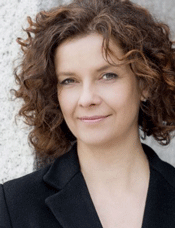Religious fervour and sexual ecstasy are almost indistinguishable in these
songs. Wolf was introduced to Emanuel Geibel’s and Paul Heyse’s
translations of Spanish poetry in 1888, an encounter which unleashed a frenzy
of creative inspiration, and which guided his musical style and techniques in
surprising new directions. Vocal lines are more melodic, less declamatory, than
his earlier settings of Eichendorff, Mörike and Goethe; in these Spanish songs,
Wolf seems to have paid less attention to the exact intonations and rhythms of
the words and instead to have submerged himself in the elated atmosphere of the
poems.
The collection is divided into sacred and secular. We began with ten of the
devotional songs, songs which are remarkably consistent in terms of mood, pace
and texture — chordal accompaniments, processional rhythms, repeating
slowly and incessantly — and which accumulate to embody the over-wrought,
obsessive sentiments of the texts.
 Ian Bostridge [Photo by Ben Ealovega]
Ian Bostridge [Photo by Ben Ealovega]
Ian Bostridge is musically and physically suited to this repertoire. His
highly nuanced style of delivery, which can at times seem over-mannered, here
perfectly conveyed the mood of agonizing guilt, self-chastisement and
martyrdom. Moving between pained earnestness and glorious rapture, Bostridge
made effective use of his powerfully focused high timbre, subtle inflections
suggesting a strained desperation, and the rich resources of a more baritonal
range. Ever alert to the piquant dissonances in the accompaniment — the
inexorable chromatic rises, the unexpectedly momentary clarity and light
offered by a major-key resolution — his diction was precise. Tall and
pale, physically responsive to the texts, he seemed to epitomise the
combination mystical reverence and delight in intensely real detail so
characteristic of Spanish baroque art.
‘Ach, wie lang die Seele schlummert’ (‘Ah, how long the
soul has slumbered’) was particularly impressive. A tritone fall in the
piano bass and the sparseness of the accompaniment at the opening of the song
create a deathly, muted ambience; Bostridge’s voice sank into its lower
regions, then rose and warmed startlingly in a glorious imitation of real and
figurative illumination as ‘the longed-for light/breaks through and
dazzles [my soul’s] eyes’. The troubled questions of ‘Herr,
was trägt der Boden hier’ (‘Lord, what will grow in this
soil’) were given musical shape by the piano’s rhetorical gestures,
while the tenor line acquired an intense focus in reply, ‘Thorns, dear
heart, for me,/ and for you a wreath of flowers’. Unease gently disturbed
the surface calm, until burst forth in an explicit outburst of anxiety,
‘O my Lord, for whose head are these wreaths woven, say?’ One was
reminded of the expressionist outpourings of El Greco.
 Angelika Kirchschlager [Photo courtesy of Askonas Holt]
Angelika Kirchschlager [Photo courtesy of Askonas Holt]
Bostridge was partnered in this recital by Angelika Kirchschlager. The
soprano seemed ill at ease initially, and given that she had cancelled a
recital just two days before, we might assume that she was suffering from a bad
cold; for her voice seemed dry and constricted at times, and her breathing
laboured. ‘Mühvoll komm’ich und beladen’ (‘In toil I
come, and heavy-laden’) is a tortured emotional drama, the dissonant
bass-register chords of the piano’s opening capturing the despairing
weariness of the opening lines, ‘In toil I come and heavy-laden,/ receive
me, O haven of mercy!’ However, Kirchschlager struggled to control her
intonation during the biting dissonances which permeate the song. She seemed
more comfortable in the only serene, contented song in the sequence, the gentle
‘Ach, des Knaben Augen’ (‘Ah, the infant’s
eyes’), where she found a warm, restful tone to convey the radiance of
the mother’s love, reflected also by the major tonality and soothing
consonance of the song.
The secular followed the sacred — twenty-four songs about romantic and
erotic love. After the sombre stillness of so many of the sacred songs, the
immediate change of style and pace was surprising: the whirling semi-quavers
and exuberant trills of the triple time ‘Kinge, klinge, mein
Pandero’ (‘Sound, tambourine, sound’) immediately whisking us
off into another world, one of joy, desire, coquetry and mockery. If anything,
it felt as if we were journeying a little too fast, as successive songs tumbled
into one another with scarcely a pause; at times the singers barely had time to
rise from their seats, so rapidly had pianist Julius Drake launched himself
into the next song.
Many of these songs are playfully ironic and tempt the singer to indulge in
some teasing play-acting; Kirchschlager clearly enjoyed the mischievousness,
but in fact she was musically more at home in the more simple euphoric songs,
such as ‘Bedeckt mich mit Blumen’ (‘Cover me with
flowers’); meanwhile Bostridge’s sometimes exaggerated vocal
gestures aptly suggested the dark ironies of these poems. ‘Auf dem grünen
Balkon’ (‘On the green balcony’) was superbly sung: the tenor
savoured the self-mockery of the poet-narrator who describes women’s
guiles, always ‘mixing a drop of sadness into pleasure:/ with her eyes
she leads me on,/ but her finger tells me: No!’ — the slightest
rhythmic hesitation wonderfully imitating the satirical effect of the
punctuation here.
Julius Drake relished the complexities and variety of the piano
accompaniments. Bostridge and Drake know each other well; typically, the
rubatos in ‘Wer sein holdes Live verloren’ (‘He who has lost
his loved one’) and the changes of pace in ‘Herz, verzage nicht
geschwind’ (Heart, do not despair too soon’) were perfectly
co-ordinated. Yet Kirchschlager seemed a little rushed, as at times Drake
allowed the admittedly soloistic writing for the piano to encourage him to
dominate and lead, when the suffering soprano might have been pleased to have a
little more time to breathe.
It was not until the twentieth century that the true significance of El
Greco’s dramatic art was appreciated and understood. Wolf is more
fortunate in having singers of this calibre and conviction to remind us what a
startlingly original composer of lieder he was.
Claire Seymour


